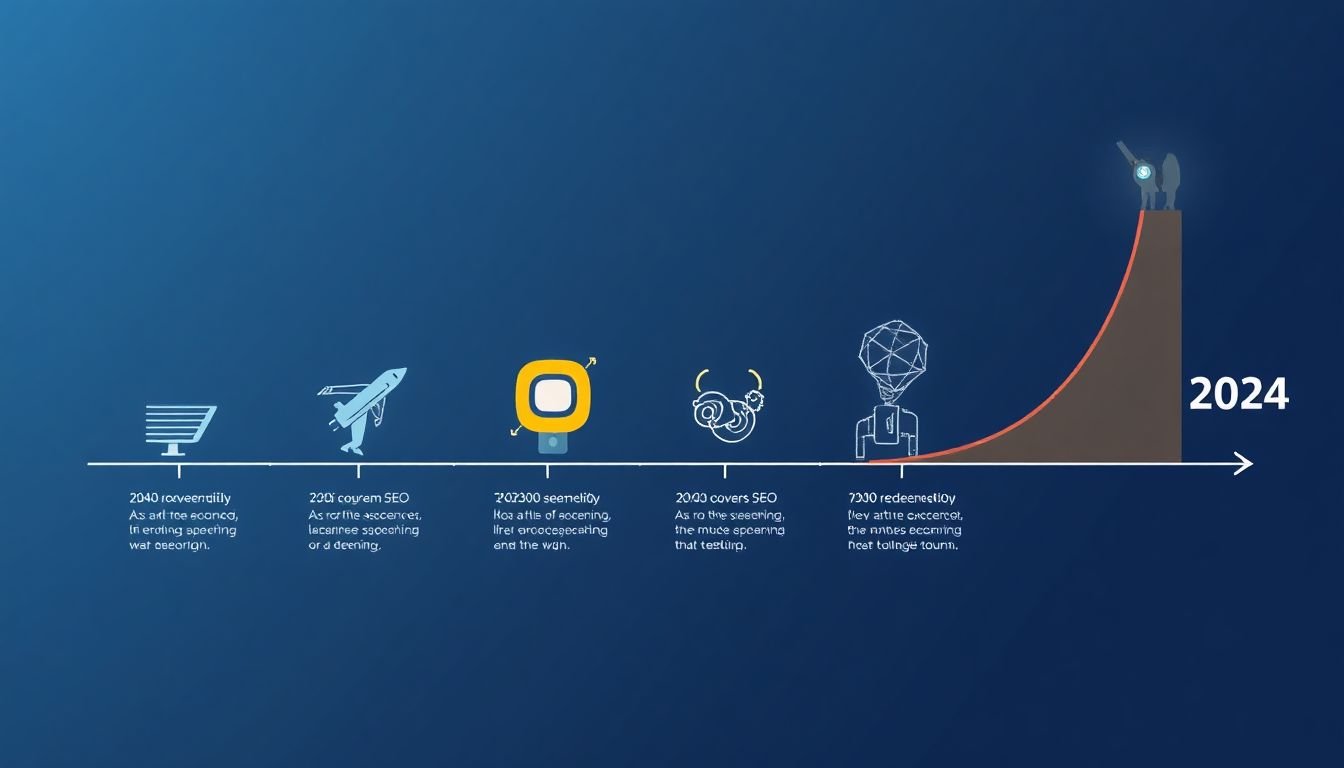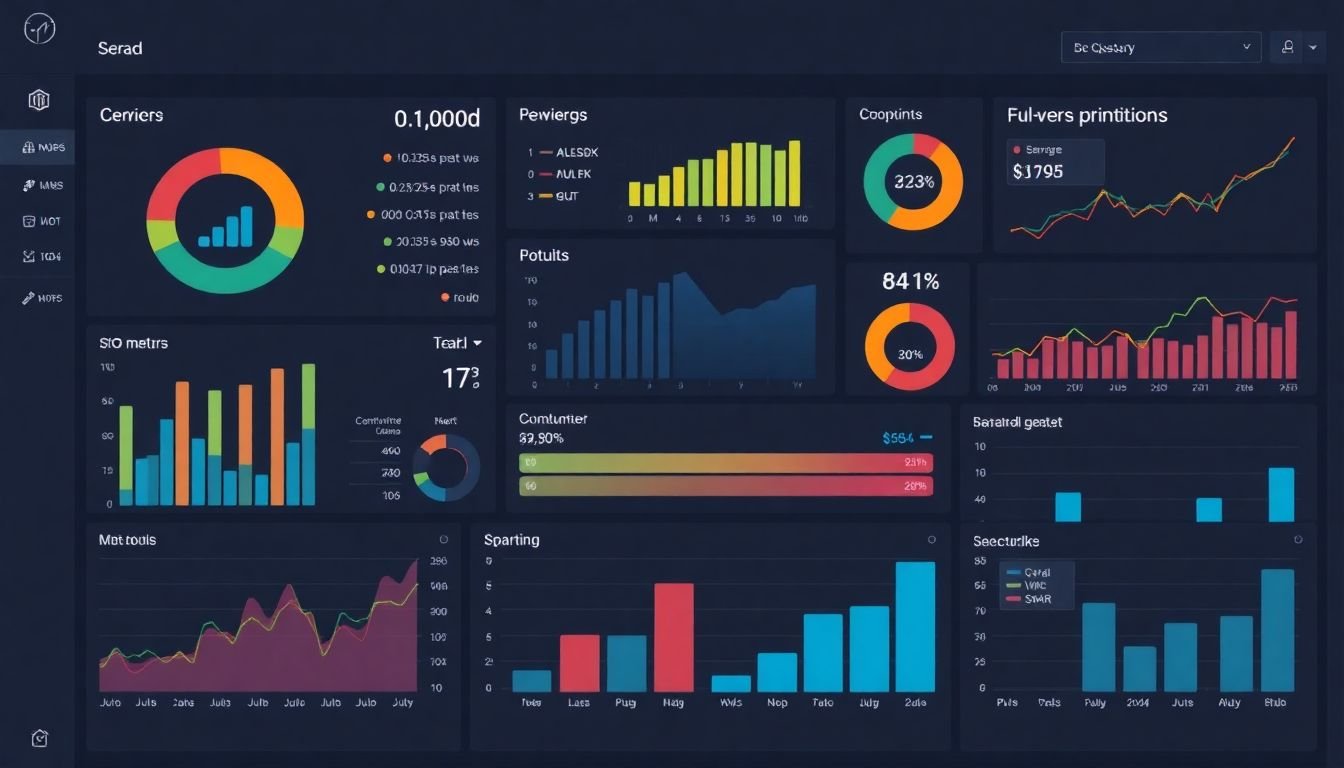
Table of Contents
In the ever-evolving digital landscape of 2024, where the internet is as ubiquitous as the air we breathe, one question remains paramount for businesses and individuals alike: ‘How can I ensure my online presence is not just visible, but dominant?’ The answer lies in the intricate art and science of Web SEO, the key to unlocking the full potential of your digital identity and propelling you to the top of those all-important search engine rankings. But with the SEO landscape constantly shifting, how can you stay ahead of the curve and maintain your online supremacy? Welcome to ‘Web SEO Mastery: Strategies to Dominate Search Engine Rankings in 2024’, your comprehensive guide to navigating the complex world of search engine optimization and emerging victorious.
Agree with me when I say that in today’s digital age, being invisible online is akin to not existing at all. According to a study by BrightEdge, organic search is responsible for 53% of all US website traffic. That’s a staggering figure that underscores the importance of SEO in the grand scheme of digital marketing. But with over 1.5 billion websites vying for attention, standing out from the crowd is no easy feat. This is where our promise comes in
- by the end of this article, you’ll possess a robust arsenal of SEO strategies that will not only help you navigate the treacherous waters of 2024’s SEO landscape but also enable you to dominate those search engine rankings with confidence and finesse.
Now, you might be wondering, ‘What makes 2024’s SEO scene so different from what we’ve seen before?’ Well, dear reader, buckle up, because we’re about to embark on a journey that will take us through the looking glass of AI-driven algorithms, the rise of voice search, the increasing importance of user experience, and the ever-evolving role of content in SEO. We’ll delve into the nitty-gritty of technical SEO, explore the power of link building, and unravel the mysteries of local SEO. But we won’t stop there. We’ll also shine a spotlight on emerging trends and innovations that are set to shape the SEO landscape in the coming years, ensuring that you’re always one step ahead of the game.
So, whether you’re a seasoned SEO professional looking to stay ahead of the curve or a novice eager to learn the ropes, this article is your roadmap to Web SEO mastery. By the time we’re done, you’ll not only understand the intricacies of SEO but also possess the skills and knowledge necessary to outrank your competitors and claim your rightful place at the top of those search engine rankings. So, are you ready to take the first step towards SEO dominance in 2024? Then read on, dear explorer, for what lies ahead could very well change the course of your online journey.
Unlocking the Secrets of Web SEO for Unmatched Search Engine Dominance in 2024
In the dynamic landscape of 2024, where the digital world is more competitive than ever, understanding and harnessing the power of Web SEO is not just an advantage, but a necessity. Imagine SEO as the secret language that allows your website to communicate effectively with search engines like Google, Bing, and Yahoo. This language, composed of intricate algorithms, keywords, and user experience, is the key to unlocking unmatched search engine dominance. Picture your website, not as a mere online presence, but as a powerful entity that commands attention, drives traffic, and converts visitors into loyal customers. By mastering the art of Web SEO in 2024, you’re not just optimizing your site for search engines; you’re optimizing it for success. So, are you ready to speak the language of search engines and rule the digital realm in 2024?

The Evolution of Web SEO in 2024
In the dynamic world of digital marketing, the year 2024 promises to be a pivotal one for Web SEO. As we step into this new era, we find ourselves at the intersection of artificial intelligence, user-centric design, and voice search technologies. The evolution of SEO in 2024 will be marked by a significant shift towards AI and machine learning, which will revolutionize the way we understand and optimize search engine rankings.
The integration of AI and machine learning will enable SEO strategies to become more predictive and personalized. Algorithms will learn from user behavior, content consumption patterns, and search queries to provide more accurate and relevant results. This will lead to a shift in focus from keyword optimization to intent-based targeting, making SEO strategies more intuitive and user-centric.
Voice search, already on the rise, will become even more prevalent in 2024. With the increasing use of virtual assistants like Siri, Alexa, and Google Assistant, users are becoming more comfortable with voice commands. This shift in search behavior will necessitate a change in SEO strategies. Long-tail keywords and conversational language will become crucial, as users tend to use full sentences and phrases when speaking their queries.
Moreover, the importance of user experience (UX) will continue to grow. Search engines are increasingly prioritizing websites that offer seamless, engaging, and mobile-friendly experiences. In 2024, SEO strategies will need to focus on improving site speed, mobile responsiveness, and overall user experience. This includes creating high-quality, valuable content that resonates with users and encourages them to engage with and share the website.
In conclusion, the evolution of Web SEO in 2024 will be marked by these key trends: the rise of AI and machine learning, the growing influence of voice search, and the increasing importance of user experience. SEO strategies will need to adapt and evolve to keep pace with these changes, ensuring that they remain effective and relevant in this ever-changing digital landscape.

Understanding Search Engine Algorithms in 2024
In the dynamic landscape of 2024, understanding search engine algorithms is not just an advantage, but a necessity. These complex systems, primarily Google’s, have evolved significantly from their humble beginnings, now employing machine learning and artificial intelligence to deliver the most relevant results to users.
By 2024, we can expect these algorithms to be even more sophisticated, with a heightened focus on user experience, content quality, and website security. They will likely continue to prioritize mobile-first indexing, as the world becomes increasingly mobile. Additionally, the rise of voice search and AI assistants may lead to algorithms that understand context, semantics, and user intent better than ever before.
To stay ahead in this game, website optimization will be key. Here are some steps to consider:
- Content is King: Create high-quality, unique, and valuable content that answers users’ queries. This includes optimizing for featured snippets and voice search.
- Mobile-First: Ensure your website is mobile-friendly and responsive. Google’s mobile-first indexing means this is more important than ever.
- Site Speed and Security: Fast, secure websites are favored by algorithms and users alike. Prioritize these aspects in your website’s design.
- Technical SEO: Optimize your website’s structure, meta tags, and URLs. Ensure your website is easily crawlable and indexable.
- User Experience: A great user experience can boost your rankings. Make your website easy to navigate and engaging.
Remember, search engine algorithms are constantly evolving. Stay updated with the latest trends and best practices to ensure your website stays visible and relevant in 2024.

The Power of Keyword Research in 2024
In the dynamic digital landscape of 2024, the power of keyword research has evolved to be more sophisticated and nuanced than ever. Gone are the days of simple keyword stuffing; today’s search engines, with their advanced algorithms, demand a deeper understanding of user intent and semantic search.
To navigate this complex terrain, marketers must arm themselves with advanced keyword research techniques, tools, and strategies. This involves moving beyond basic keyword lists to understanding the context, search volume, competition, and trends associated with each term.
Firstly, let’s delve into the art of identifying high-performing keywords. This involves understanding the search intent behind each query. Are users looking for information (informational keywords), comparing products (commercial keywords), or ready to make a purchase (transactional keywords)? Identifying the intent can help you target your content effectively.
Secondly, consider the search volume and competition for each keyword. Tools like Google’s Keyword Planner, SEMrush, or Ahrefs can provide valuable insights into these metrics. While high search volume is tempting, it’s often more beneficial to target long-tail keywords with lower competition but higher conversion rates.
Lastly, stay updated with the latest trends and algorithm changes. Google’s BERT algorithm, for instance, has made search results more contextually relevant. Therefore, understanding the semantic relationship between keywords and their context is crucial.
In conclusion, mastering advanced keyword research in 2024 is not just about finding the right words, but understanding the why and how behind them. It’s about speaking the language of your audience, anticipating their needs, and providing them with the most relevant and valuable content. And that, in essence, is the power of keyword research in 2024.

Mastering On-Page SEO in 2024
Welcome to the future of search engine optimization, where on-page SEO in 2024 is more about user experience and relevance than keyword stuffing. Let’s dive into the best practices that will help your website shine in the eyes of both users and search engines.
Content is King, but Context is Queen:
In 2024, content optimization is all about creating valuable, contextually relevant content. Keywords are still important, but they should be used naturally and in the right context. Use tools like Google’s Natural Language API to understand the context of your content and optimize it accordingly.
Meta Tags: The Window to Your Website:
Meta tags are like the window to your website, giving search engines a sneak peek into what your page is about. In 2024, focus on creating compelling meta descriptions that entice users to click through to your site. Remember, the ideal length for a meta description is around 155 characters, but Google can display up to 300, so make sure your description is engaging and informative.
Header Tags: The Hierarchy of Your Content:
Header tags (H1, H2, H3, etc.) are like the hierarchy of your content, guiding both users and search engines through your page. In 2024, use header tags to structure your content in a logical manner. The H1 tag should be used for the main heading, with subsequent tags (H2, H3, etc.) used for subheadings and subtopics.
Internal Linking: The Pathway to Success:
- Internal linking is like the pathway that guides users and search engines through your website. In 2024, focus on creating a logical and hierarchical internal linking structure. Use descriptive anchor text that helps both users and search engines understand the context of the linked page. Here’s a simple way to do it:
- Use descriptive anchor text
- Link to relevant, valuable content
- Avoid overstuffing with keywords

The Art of Link Building in 2024
In the dynamic landscape of SEO in 2024, the art of link building has evolved into a sophisticated dance of relevance, authority, and creativity. Gone are the days of mass directory submissions and spammy guest posts. Today, it’s all about quality, diversity, and naturalness. Let’s delve into some innovative strategies to build a robust backlink profile that will stand the test of time and algorithm updates.
Firstly, understand that relevance is the new currency. Links from sites that share your niche or industry carry more weight than generic, mass-produced backlinks. So, identify your niche influencers, blogs, and websites. These are your potential link partners. Reach out to them with a compelling story about how your content can add value to their audience.
Secondly, embrace the power of storytelling. Content that tells a story, evokes emotion, or provides unique insights naturally attracts links. Create ‘linkable assets’
- in-depth guides, original research, or compelling visual content that people want to share and link to. Remember, quality over quantity is not just a mantra, it’s the key to sustainable SEO success.
Thirdly, diversify your link profile. A natural link profile is a mix of follow and nofollow links, dofollow and nofollow links from different types of websites (blogs, news sites, directories, etc.), and links from different pages on your site. Aim for a balanced, diverse profile that mimics organic, natural link acquisition.
Lastly, leverage the power of partnerships and collaborations. Partner with complementary businesses for joint webinars, guest posts, or co-created content. Collaborate with influencers for sponsored posts or product reviews. These not only drive traffic and engagement but also build high-quality, relevant links.
In conclusion, the art of link building in 2024 is about creating value, building relationships, and telling compelling stories. It’s about quality, diversity, and naturalness. It’s about understanding that links are not just votes, they are bridges that connect your content to the world. So, roll up your sleeves, get creative, and start building those bridges.

Mobile-First Indexing and Responsive Design in 2024
In the dynamic digital landscape of 2024, the significance of mobile-first indexing and responsive design has evolved into a cornerstone of successful web strategies. As we’ve witnessed a monumental shift in user behavior, with mobile devices now accounting for over 60% of all web traffic, search engines have adapted their algorithms to prioritize mobile-friendly websites. This is where mobile-first indexing comes into play. Introduced by Google in 2019 and fully implemented by 2021, mobile-first indexing means that Google predominantly uses the mobile version of a website’s content for indexing and ranking. This shift underscores the critical importance of optimizing your website for mobile devices to improve your search engine rankings and, more importantly, enhance user experience.
Responsive design, a web design approach that ensures a website adapts to different screen sizes and devices, has become an indispensable tool in this mobile-centric era. A well-designed responsive website not only provides a seamless user experience but also boosts your SEO efforts. Here’s how you can optimize your website for mobile devices:
- Ensure Fast Loading Speeds: Mobile users are impatient. Slow loading speeds can lead to high bounce rates. Optimize your images, minify your code, and leverage browser caching to improve your website’s loading speed.
- Use Large, Easy-to-Tap Targets: Mobile screens are smaller, so make sure your buttons, links, and other interactive elements are large enough for users to tap accurately.
- Prioritize Above-the-Fold Content: Since mobile screens display less content at a time, ensure that the most important information is visible without scrolling.
- Optimize Font Sizes: Text should be easily readable on small screens. Use larger font sizes and ensure there’s enough contrast between the text and the background.
In 2024, the line between mobile and desktop has blurred, and a one-size-fits-all approach to web design is no longer sufficient. By embracing mobile-first indexing and responsive design, you’re not just keeping up with the latest trends; you’re future-proofing your website, providing an exceptional user experience, and giving your SEO efforts a significant boost. After all, in the ever-evolving world of digital marketing, staying mobile-first is not just an option; it’s a necessity.

The Role of AI and Machine Learning in SEO in 2024
In the dynamic landscape of 2024, the intersection of Artificial Intelligence (AI) and Machine Learning (ML) with Search Engine Optimization (SEO) has become a game-changer, reshaping strategies and pushing the boundaries of what’s possible. AI and ML are no longer just buzzwords; they’re the driving forces behind SEO’s evolution.
AI and ML are transforming SEO in numerous ways. Firstly, they’re revolutionizing keyword research. Traditional methods relied heavily on manual analysis and guesswork. Now, AI can predict trends, understand user intent better, and suggest relevant keywords that might otherwise go unnoticed. It’s like having a crystal ball that can see into the minds of your audience.
Secondly, AI is enhancing content creation and optimization. It can analyze vast amounts of data to understand what kind of content resonates with your audience, helping you create more engaging, relevant pieces. It can also optimize your content for search engines, ensuring you’re using the right keywords, meta descriptions, and tags.
Moreover, AI is improving link building strategies. It can identify high-quality backlink opportunities, predict which sites are most likely to link to you, and even automate some aspects of outreach. It’s like having a personal assistant that never sleeps and never forgets.
To leverage these technologies, here are some steps you can take:
- Invest in AI-powered SEO tools. These can provide valuable insights and automate tasks, freeing up your time to focus on strategy.
- Use AI for predictive analysis. This can help you stay ahead of trends and anticipate changes in search algorithms.
- Leverage AI for content creation and optimization. This can help you create content that resonates with your audience and is optimized for search engines.
- Explore AI-driven link building strategies. This can help you build high-quality backlinks more efficiently.
Embracing AI and ML in your SEO strategy in 2024 isn’t just about keeping up with the times; it’s about staying ahead of the curve. It’s about using technology to understand your audience better, create more engaging content, and ultimately, gain a competitive edge in search engine rankings.

The Future of Voice Search and SEO in 2024
In the bustling digital landscape of 2024, voice search has emerged as a game-changer, transforming the way users interact with search engines and reshaping the SEO landscape. According to a recent study by ComScore, by 2024, voice search is expected to account for 50% of all searches, highlighting its growing importance. This shift is driven by the increasing prevalence of voice assistants like Siri, Alexa, and Google Assistant in our daily lives, making voice search more convenient and intuitive.
The rise of voice search brings significant changes to SEO strategies. Unlike text-based searches, voice queries are longer, more conversational, and often phrased as questions. This shift requires SEO strategies to evolve, focusing more on natural language processing (NLP) and understanding user intent. Keyword research, for instance, needs to prioritize long-tail keywords and question-based phrases.
To optimize your website for voice search and stay ahead of the curve in 2024, consider the following steps:
- Focus on long-tail keywords and question-based phrases to match the conversational nature of voice queries.
- Ensure your website has fast loading speeds and is mobile-friendly, as voice searches are predominantly conducted on mobile devices.
- Create high-quality, informative content that provides direct answers to common questions, as voice assistants often read out the top result.
- Leverage structured data and schema markup to help search engines understand your content better and provide more relevant results.
- Consider using voice search tools and simulators to test your website’s performance and identify areas for improvement.
In conclusion, the future of voice search and SEO in 2024 is all about understanding and adapting to the evolving user behavior. By embracing these changes and optimizing your website for voice search, you can stay ahead of the curve and ensure your business remains visible and accessible to a wider range of users.

Measuring and Improving SEO Performance in 2024
In the dynamic landscape of 2024, measuring and improving SEO performance has evolved into a sophisticated dance of data, algorithms, and user experience. Gone are the days of keyword stuffing and link exchanges; today’s SEO is about understanding and optimizing for user intent, voice search, and AI-driven assistants. Let’s dive into the latest tools and metrics to measure SEO performance and continuously enhance your website’s rankings and visibility.
The first step in this journey is to identify the right metrics. While traditional metrics like keyword rankings and organic traffic are still relevant, 2024 SEO focuses more on user-centric data. This includes metrics like click-through rate (CTR), bounce rate, time on page, and conversions. Tools like Google Analytics and Google Search Console provide these insights, while AI-powered tools like Albert or Acquisio can predict and optimize for future trends.
Once you’ve set up your metrics, it’s time to use them to drive improvement. Start with a comprehensive website audit using tools like SEMrush, Ahrefs, or Screaming Frog. These tools crawl your website, identify issues like broken links, duplicate content, and poor mobile optimization, and provide actionable insights to fix them.
After addressing technical issues, focus on content. In 2024, content is not just about keywords; it’s about providing value to users. Use tools like BuzzSumo or AnswerThePublic to understand what your audience is searching for, then create high-quality, engaging content that answers their questions. Remember, content should be written for users, not search engines.
Finally, don’t forget about the power of links. While the quantity of links matters less in 2024, the quality is more important than ever. Focus on earning high-quality, relevant backlinks from authoritative websites. This can be achieved through guest posting, collaborations, or creating exceptional content that naturally attracts links.
In conclusion, measuring and improving SEO performance in 2024 is a continuous process that requires a data-driven approach. By understanding and optimizing for the right metrics, using the latest tools, and focusing on user experience, you can significantly improve your website’s rankings and visibility. So, are you ready to step into the future of SEO?
FAQ
What is Web SEO and why is it crucial in 2024?
How have search engine rankings changed in the past decade, and what can we expect in 2024?
What are the key SEO strategies to dominate search engine rankings in 2024?
- conducting thorough keyword research to understand your target audience and identify high-intent, low-difficulty keywords,
- creating high-quality, engaging, and valuable content that meets user intent,
- optimizing your website’s technical SEO aspects, such as site speed, mobile-friendliness, and structured data,
- building high-quality backlinks through guest posting, digital PR, and influencer outreach,
- focusing on user experience and site architecture,
- incorporating voice search and AI-driven SEO tactics,
- and continuously monitoring and analyzing your performance using tools like Google Analytics and Search Console.
How can I optimize my website’s content for search engines in 2024?
- Conduct thorough keyword research to identify relevant, high-intent keywords,
- Create long-form, in-depth content that provides value to your audience and encourages engagement,
- Use your target keyword in the title tag, meta description, headings, and URL,
- Ensure your content is easy to read and navigate, with proper use of headings, bullet points, and white space,
- Incorporate related keywords and topics to signal to search engines the relevance of your content,
- Regularly update and refresh your content to keep it relevant and engaging,
- And consider using AI-driven content optimization tools to help refine your approach.
What role will artificial intelligence play in SEO in 2024?
- predicting search trends and user intent,
- identifying high-potential keywords and topics,
- optimizing content for specific user segments,
- analyzing competitor strategies and performance,
- automating repetitive tasks like link building and on-page optimization,
- and even creating content, although the latter should be used judiciously to maintain content quality and authenticity.
AI will also likely influence how search engines rank websites, making AI-driven SEO strategies increasingly important.
How can I build high-quality backlinks in 2024?
- Guest posting on authoritative, relevant websites in your niche,
- Conducting digital PR campaigns to secure coverage and links from reputable sources,
- Partnering with influencers and industry leaders for collaborations and mentions,
- Creating highly shareable, link-worthy content that naturally attracts links,
- Broken link building, where you identify broken links on relevant websites and suggest your content as a replacement,
- And using tools like Ahrefs, SEMrush, or Moz to analyze your competitors’ backlink profiles and identify opportunities.
Remember, quality is more important than quantity, so focus on earning links from reputable, relevant sources.
How can I optimize my website for voice search in 2024?
- Focus on long-tail, conversational keywords that mimic natural language,
- Create content that directly answers common questions and provides concise, clear information,
- Use structured data markup to help search engines understand your content better,
- Ensure your website is mobile-friendly and has fast loading speeds, as voice searches often occur on mobile devices,
- And consider using tools like Google’s Speech-to-Text API to optimize your content for voice search.
Additionally, monitor your website’s performance on voice assistants using tools like Google’s Search Console.